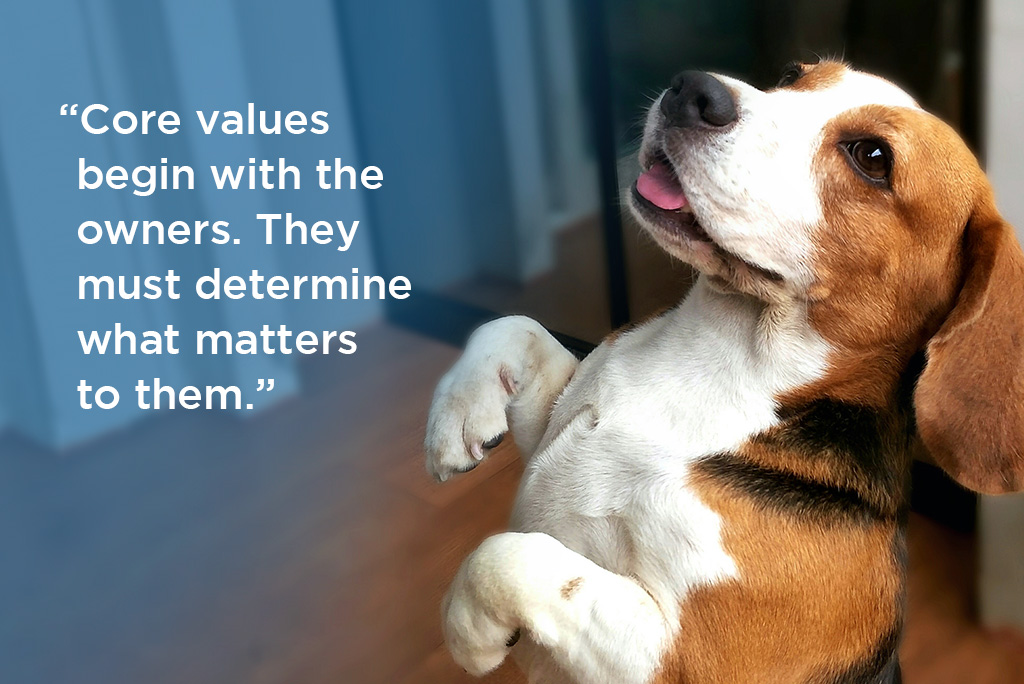I confess that for a long time I didn’t see the need for a formal Core Values statement. My practice had a great culture with wonderful people and we lived common values of reliability, solid medical ethics, empathy and support for ourselves and others… but we never wrote them down. Looking back, I wish I had.
Going through the process of developing a formal Core Values statement is one of the first things I do when I take on a new consulting client. Some have their values listed and others haven’t taken the time to consider them. Some don’t even know how to start. I thought I would share a little of the process.

Core values begin with the owners. They must determine what matters to them. For some, empathy and compassion are at their core, for others it is education and professionalism. The exercise I use is to share a list of core value words. Then the owner is instructed to circle all the words that resonate with them about their practice philosophy. If this is a partnership, each partner is asked to make their own list. There are many word lists to be found in an online search. Next the lists are compared for words both partners have chosen. The list is then reviewed for words easily considered synonymous and of those groups one is chosen as the best fit for what owners’ value. Usually, we try to narrow this down to between 4 – 6 words. Too many core values dilutes the importance of each one and makes focusing actions difficult.
Once the list is created we get the team involved. First, do they agree these are the values of the team? There can be discussion about alternate word choice if needed. If the core values words are suitable then we begin to flesh out how to create behaviors that manifest each of the values. For example: “Community” was chosen by one of my clients and her team. They valued the relationships they had built in their area and worked to reach out to help people and animals outside their walls when possible. In our exploration of how to “live” community values they decided that building relationships with their clients beyond transactions, creating education on pet health to share in outreach and working with local charities would be how they manifested this value.
Finally, I wrote for them the “We Will” statement. In this statement each Core Value is listed and a short paragraph of explanation shares how this value is to be upheld by the team. The language is emotional and compelling.
OK, this all sounds great but very touchy feely. Why are Core Values really very practical? Because we use them to set the standard to which we hire. Once we have our values in place we have a platform to use to create behavior-based interview questions. Taking the “community” value from above, we could ask our candidate, “tell me about a time when you worked on a community project inside or outside of veterinary medicine.” We may discover that our candidate had performed community outreach in several areas of their life, or that they were never involved or cared to be. If they don’t value community they may be a poor fit for your culture.
We also use Core Values for accountability. If one of the team is not behaving appropriately then we can share this in a discussion about upholding the core values. Often a practice will choose “kindness” as a value. If you have a team member who is rude or gossiping, these are unkind behaviors which can be shown as a break down of the team core values.
I encourage you to move forward in this Core Values exercise. If you have your values in place, the beginning of the year is always a good time to revisit them with the team in a meeting. Once again, share the We Will statement and discuss how the team is living your values on a daily basis. Keep them and your Mission statement in front of you as a light to guide your practice and the path will be bright for the future.
If you need help creating your Core Values please reach out. www.dboone2managevets.com
 by a veterinarian
by a veterinarian


